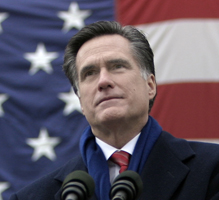Dutiful Romney Continues Struggle for Votes
Dutiful Romney Continues Struggle for Votes

By Mick Lundstrum and Aubrey Immelman
Unit for the Study of Personality in Politics
January 11, 2008
Mitt Romney, the presidential candidate better known for his Mormon faith than for his policy positions, has been dogged by obstacles and setbacks on the campaign trail. In Iowa, where he had dumped nearly three-fifths of his campaign expenditure, he was blindsided by the come-from-nowhere Huckabee juggernaut. In New Hampshire, he was bested by a resuscitated back-from-the-dead McCain campaign.
By all appearances, Gov. Romney is an attractive candidate. He looks “presidential,” is well financed, and has a strong track record in business and government. Yet, despite an MBA and law degree from Harvard, a successful business career as management consultant and venture capitalist, president and CEO of the 2002 Salt Lake Winter Olympics Organizing Committee, governor of Massachusetts, and chair of the Republican Governors’ Association, Romney has found little traction with Republican voters.
So, how do we account for Romney’s floundering campaign for Republican support?
Some have pointed to Romney’s Mormon beliefs, viewed with suspicion by elements of the Christian Evangelical Republican base. Others have pointed to his “flip-flop” on abortion. Another consideration, which has not received much air time in the media or in print, is Romney’s personality — those aspects of his typical modes of thinking, acting, and relating to others that remain relatively consistent over time and across situations.
For insight into this aspect Romney’s character, we generated a personality profile using a standard assessment procedure developed at the Unit for the Study of Personality in Politics at the College of St. Benedict and St. John’s University in Minnesota. This is what we found.
Conscientious
Perhaps not surprising for someone with Romney’s academic and professional credentials, he emerged from the assessment as a highly conscientiousness personality. What is remarkable, however, is that few candidates for president can claim conscientiousness as a prominent trait — in the past several elections cycles, an exclusive club of losing candidates consisting of Michael Dukakis, Bob Dole, Steve Forbes, Bill Bradley, and Al Gore.
People with Romney’s levels of conscientiousness are best described as “dutiful.” They are characteristically proper and dignified, dependable, and principled (though the latter trait is somewhat at variance with perceptions of Romney as a flip-flopper).
Above all, they are highly organized, which accounts for Romney’s roaring success in organizational and corporate management and financial restructuring. Dutiful and diligent, and adept at getting the job done without letting work accumulate, conscientious leaders are movers and shakers who are at the top of their game when making and implementing policy.
On the downside, conscientious persons can be rigid thinkers with a closed-minded tendency; as leaders, they are technocratic rather than visionary. For that reason, in high political office they may be better suited to the role of assistant to the chief executive — perhaps as vice president, cabinet secretary, or chief of staff.
With their attention to detail, their work ethic, and their prudence, conscientious persons are potentially good leaders; however, in the United States they usually have trouble attaining high-level political office, because of the difficulty they have connecting with voters and the media.
Dominant
Like many politicians who strive for higher political office, Romney also has a pronounced dominant tendency — though not nearly as pervasive as the aggressive dominance of a Rudy Giuliani or the self-assertive boldness of a John McCain. Instead, it would be more accurate to describe Romney as merely assertive, strong-willed, and goal-directed.
Some aspects of Romney’s dominance reinforce his fundamental conscientious tendency — most notably his strong work ethic, proneness to cognitive inflexibility, and obstinacy, which suggests he may stay in the race longer than he remains a viable candidate. That said, leaders like Romney, with moderate levels of conscientiousness and dominance, generally are effective, deliberative leaders who make informed decisions and get things done.
In terms of his experience and psychological profile, Romney may be one of the better candidates for president, but as recent presidential election history has shown, he does not fit the profile of a successful presidential candidate.
Next Tuesday’s Republican primary in Michigan — where native son Mitt Romney has the rare advantage of contesting an early-primary state where his father once served as governor — will be the acid test for whether that particular chapter in U.S. election history repeats itself.
Note. A slightly revised version of this article was published as the “Your Turn” column Romney is conscientious and assertive in the St. Cloud Times (p. 5B), Jan. 15, 2008.










Follow Aubrey Immelman